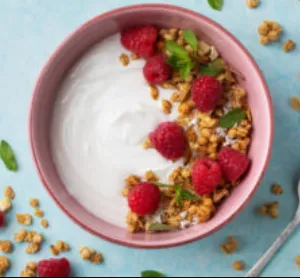Food and beverage manufacturers have a sweet solution to consumers’ growing demand for sugar-free and zero-calorie products. Stevia leaf extract, or simply stevia, is a safe and natural sweetener that serves as an enticing alternative to artificial sweeteners and sugar in many food offerings throughout the grocery store.
What Is Stevia?
Stevia is a plant (Stevia rebaudiana) cultivated primarily in South America. Its leaves have been used as a natural sweetener for more than two centuries. One of the many advantages of stevia is its intense sweetness; some of its molecules are up to 400 times sweeter than sugar.
The source of that sweetness is several naturally occurring compounds. There are 30 different steviol glycosides in a stevia leaf, with the most abundant being rebaudioside A (or Reb) and stevioside.
How Is Stevia Processed?
Stevia suppliers manufacture highly purified steviol glycoside extracts, the form of stevia that is generally recognized as safe (GRAS) by the FDA and other governmental bodies. Processing typically involves several steps after the leaf is harvested and dried.
- Extraction – The stevia extraction process is typically using hot water to extract steviol glycosides from the leaves. Some suppliers also use an alcohol solvent, which is later removed.
- Filtration – The liquid extract is separated from organic and leaf material through filtration. This also removes any salt content.
- Purification – The stevia extract is passed through ion-exchange resins with charged particles to capture the steviol glycosides, then rinsed to remove the resin.
- Concentration – Once purified, the extract liquid is further concentrated via reverse osmosis or evaporation. This results in crystallization, which can be adjusted to suit specific end-use stevia applications.
- Drying – The crystals are separated from the liquid and dried.
- Milling – The crystals are milled to produce a consistent particle size. In most cases, the extract is blended with maltodextrin, dextrose, or another bulking agent. This allows for one-to-one stevia sugar substitution in most applications, while accounting for stevia’s intense sweetness.
Common Stevia Applications in Food and Beverage Products
Stevia is an ideal plant-based sweetener that often replaces sugar or artificial sweeteners. It is often used across categories such as:
Stevia Goes Mainstream
Stevia’s history dates back centuries, but it wasn’t until the 1970s that it was first used in commercial applications. Japanese scientists created a commercially viable extract, which was quickly popularized in the country and globally. The FDA considers processed stevia extract products to be generally recognized as safe (GRAS), but raw stevia and crude extracts are not considered safe for human consumption.
Today, the stevia market is valued at over $513.4 million, with a forecasted 11.9% compound annual growth rate (CAGR) through 2030. This growth is fueled by strong consumer demand for natural, non-caloric sweeteners, particularly those that can replace artificial sweeteners. This is largely supported by a regulatory environment that is shifting away from some artificial ingredients.
Stevia’s Health Credentials
The various stevia sweeteners on the market offer considerable health benefits compared to traditional sugar. In addition to being GRAS by the FDA, stevia is also approved by the European Food Safety Authority, and the World Health Organization and Food and Agriculture Organization’s Joint Expert Committee on Food Additives (JECFA).
The Advantages and Disadvantages of Stevia
Stevia Advantages
- Stevia and blood sugar management – Stevia does not spike blood sugar. It reduces overall glycemic load. It may also improve insulin sensitivity; however, further research is needed.
- Weight management – Sugar packs about 16 calories per teaspoon. Stevia packs 0. Replacing sugar with stevia eliminates caloric intake from excess sugar, which may support weight loss over time.
- Dental health – Stevia does not ferment when exposed to oral bacteria, which means it won’t cause cavities or tooth decay.
Stevia Disadvantages
- Stevia and GI health – Some individuals report digestive issues when using stevia, although bloating, gas, and discomfort may also be attributed to bulking agents.
- Medication interaction – Stevia may lower blood sugar and blood pressure levels, which can cause problems for individuals taking certain medications. Always consult a healthcare professional about your diet, especially if you experience any issues when using stevia.
Stevia: Sugar Substitute and Ideal Ingredient
As a non-caloric sweetener, stevia offers tremendous consumer appeal and delightful results. Tilley Distribution offers convenient access to this essential ingredient. We’re so much more than a catalog, however; we provide technical and formulation expertise, helping customers craft the perfect product. Connect with leading stevia suppliers and our technical team today; contact us to learn more.
